新视野大学英语unit1-A
- 格式:ppt
- 大小:7.65 MB
- 文档页数:69
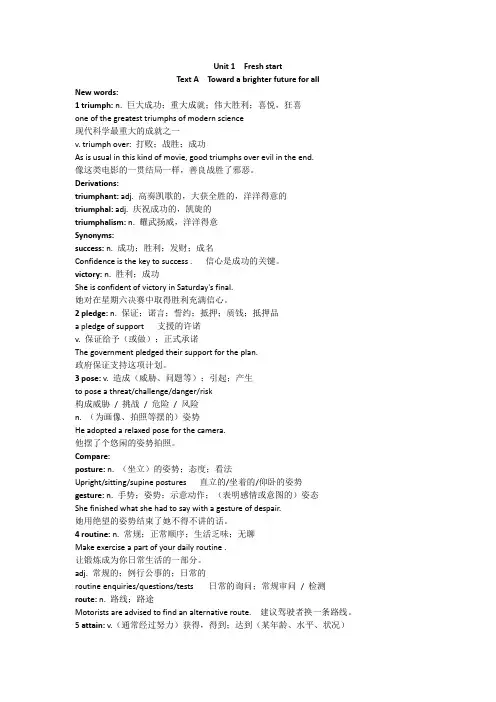
Unit 1 Fresh startText A Toward a brighter future for allNew words:1 triumph: n. 巨大成功;重大成就;伟大胜利;喜悦,狂喜one of the greatest triumphs of modern science现代科学最重大的成就之一v. triumph over: 打败;战胜;成功As is usual in this kind of movie, good triumphs over evil in the end.像这类电影的一贯结局一样,善良战胜了邪恶。
Derivations:triumphant: adj. 高奏凯歌的,大获全胜的,洋洋得意的triumphal: adj. 庆祝成功的,凯旋的triumphalism: n. 耀武扬威,洋洋得意Synonyms:success: n. 成功;胜利;发财;成名Confidence is the key to success . 信心是成功的关键。
victory: n. 胜利;成功She is confident of victory in Saturday's final.她对在星期六决赛中取得胜利充满信心。
2 pledge: n. 保证;诺言;誓约;抵押;质钱;抵押品a pledge of support 支援的许诺v. 保证给予(或做);正式承诺The government pledged their support for the plan.政府保证支持这项计划。
3 pose: v. 造成(威胁、问题等);引起;产生to pose a threat/challenge/danger/risk构成威胁/ 挑战/ 危险/ 风险n. (为画像、拍照等摆的)姿势He adopted a relaxed pose for the camera.他摆了个悠闲的姿势拍照。
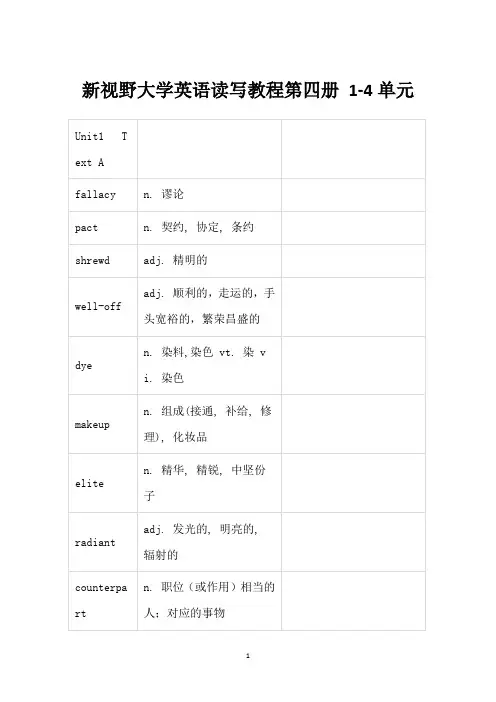
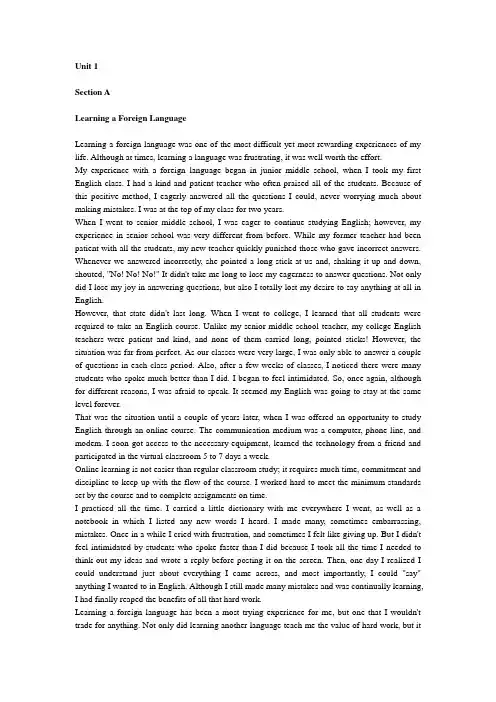
Unit 1Section ALearning a Foreign LanguageLearning a foreign language was one of the most difficult yet most rewarding experiences of my life. Although at times, learning a language was frustrating, it was well worth the effort.My experience with a foreign language began in junior middle school, when I took my first English class. I had a kind and patient teacher who often praised all of the students. Because of this positive method, I eagerly answered all the questions I could, never worrying much about making mistakes. I was at the top of my class for two years.When I went to senior middle school, I was eager to continue studying English; however, my experience in senior school was very different from before. While my former teacher had been patient with all the students, my new teacher quickly punished those who gave incorrect answers. Whenever we answered incorrectly, she pointed a long stick at us and, shaking it up and down, shouted, "No! No! No!" It didn't take me long to lose my eagerness to answer questions. Not only did I lose my joy in answering questions, but also I totally lost my desire to say anything at all in English.However, that state didn't last long. When I went to college, I learned that all students were required to take an English course. Unlike my senior middle school teacher, my college English teachers were patient and kind, and none of them carried long, pointed sticks! However, the situation was far from perfect. As our classes were very large, I was only able to answer a couple of questions in each class period. Also, after a few weeks of classes, I noticed there were many students who spoke much better than I did. I began to feel intimidated. So, once again, although for different reasons, I was afraid to speak. It seemed my English was going to stay at the same level forever.That was the situation until a couple of years later, when I was offered an opportunity to study English through an online course. The communication medium was a computer, phone line, and modem. I soon got access to the necessary equipment, learned the technology from a friend and participated in the virtual classroom 5 to 7 days a week.Online learning is not easier than regular classroom study; it requires much time, commitment and discipline to keep up with the flow of the course. I worked hard to meet the minimum standards set by the course and to complete assignments on time.I practiced all the time. I carried a little dictionary with me everywhere I went, as well as a notebook in which I listed any new words I heard. I made many, sometimes embarrassing, mistakes. Once in a while I cried with frustration, and sometimes I felt like giving up. But I didn't feel intimidated by students who spoke faster than I did because I took all the time I needed to think out my ideas and wrote a reply before posting it on the screen. Then, one day I realized I could understand just about everything I came across, and most importantly, I could "say" anything I wanted to in English. Although I still made many mistakes and was continually learning, I had finally reaped the benefits of all that hard work.Learning a foreign language has been a most trying experience for me, but one that I wouldn't trade for anything. Not only did learning another language teach me the value of hard work, but italso gave me insights into another culture, and my mind was opened to new ways of seeing things. The most wonderful result of having learned a foreign language was that I could communicate with many more people than before. Talking with people is one of my favorite activities, so being able to speak a new language lets me meet new people, participate in conversations, and form new, unforgettable friendships. Now that I speak a foreign language, instead of staring into space when English is being spoken, I can participate and make friends. I am able to reach out to others and bridge the gap between my language and culture and theirs.Words: 700。

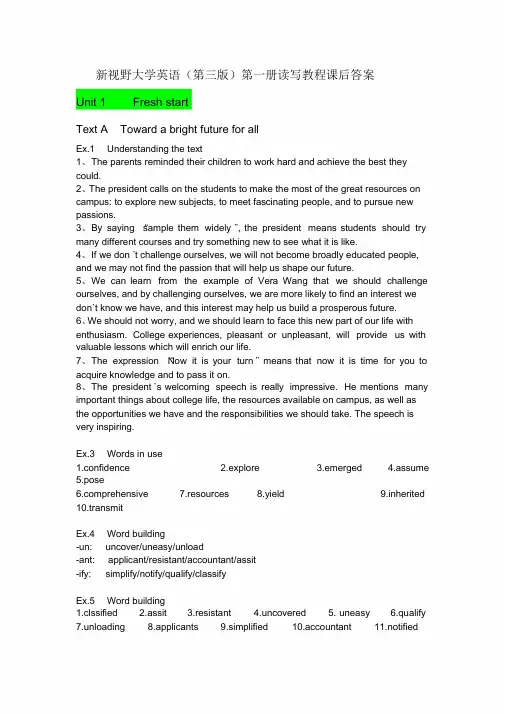
新视野大学英语(第三版)第一册读写教程课后答案Unit 1 Fresh startText A Toward a bright future for allEx.1 Understanding the text1、The parents reminded their children to work hard and achieve the best they could.2、The president calls on the students to make the most of the great resources on campus: to explore new subjects, to meet fascinating people, and to pursue new passions.3、By saying “sample them widely ”, the president means students should try many different courses and try something new to see what it is like.4、If we don ’t challenge ourselves, we will not become broadly educated people, and we may not find the passion that will help us shape our future.5、We can learn from the example of Vera Wang that we should challenge ourselves, and by challenging ourselves, we are more likely to find an interest we don’t know we have, and this interest may help us build a prosperous future.6、We should not worry, and we should learn to face this new part of our life with enthusiasm. College experiences, pleasant or unpleasant, will provide us with valuable lessons which will enrich our life.7、The expression “Now it is your turn ”means that now it is time for you to acquire knowledge and to pass it on.8、The president ’s welcoming speech is really impressive. He mentions many important things about college life, the resources available on campus, as well as the opportunities we have and the responsibilities we should take. The speech is very inspiring.Ex.3 Words in use1.confidence2.explore3.emerged4.assume5.poseprehensive7.resources8.yield9.inherited 10.transmitEx.4 Word building-un: uncover/uneasy/unload-ant: applicant/resistant/accountant/assit-ify: simplify/notify/qualify/classifyEx.5 Word building1.clssified2.assit3.resistant4.uncovered5. uneasy6.qualify7.unloading8.applicants9.simplified 10.accountant 11.notifiedEx.6 Banked cloze1-5: D H A B M 6-10: F O I G JEx.7 Expressions in use2.got by 2.make the most of3.in advance4.over time5.reap the benefits of7.all at once 7.remind ⋯of 8.stand a chance of 9.open the door to11.take pleasure inEx.9 Structured writingThere are some things you can do to succeed in college. First, pursue passions.Your passions will broaden your mind and make your life interesting. Second,never let go of any opportunities that come your way. College is full of unique opportunities, which will enable you to sample new things and meet wonderfulpeople. Lastly, take responsibilities. In college you must learn to be responsiblefor your own decisions and actions. With the passions, the opportunities, and theability to take responsibilities, you will become successful not only in college, butalso in your future career.Ex.10 E-C Translation苏格拉底是古希腊哲学家,被誉为现代西方哲学的奠基人。
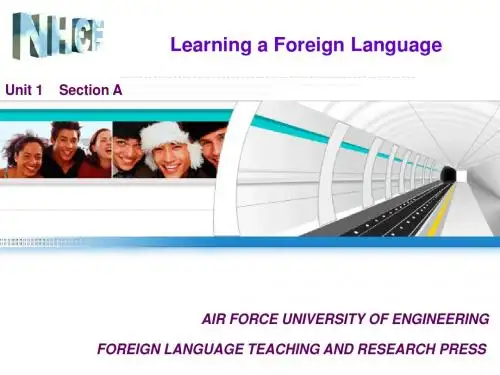

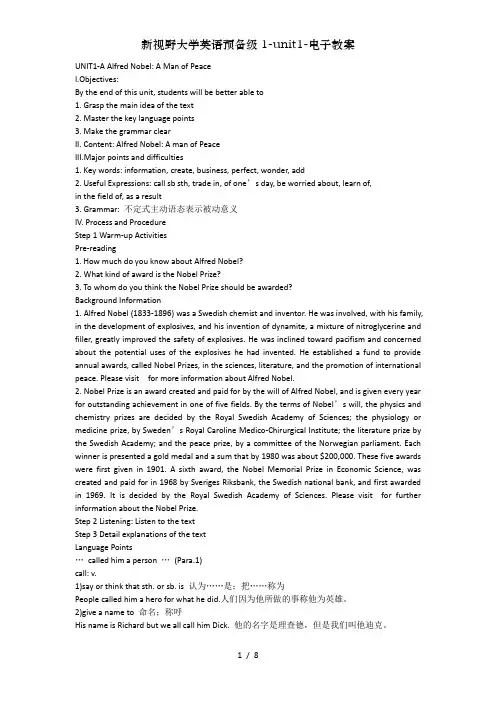
UNIT1-A Alfred Nobel: A Man of PeaceI.Objectives:By the end of this unit, students will be better able to1. Grasp the main idea of the text2. Master the key language points3. Make the grammar clearII. Content: Alfred Nobel: A man of PeaceIII.Major points and difficulties1. Key words: information, create, business, perfect, wonder, add2. Useful Expressions: call sb sth, trade in, of one’s day, be worried about, learn of,in the field of, as a result3. Grammar: 不定式主动语态表示被动意义IV. Process and ProcedureStep 1 Warm-up ActivitiesPre-reading1. How much do you know about Alfred Nobel?2. What kind of award is the Nobel Prize?3. To whom do you think the Nobel Prize should be awarded?Background Information1. Alfred Nobel (1833-1896) was a Swedish chemist and inventor. He was involved, with his family, in the development of explosives, and his invention of dynamite, a mixture of nitroglycerine and filler, greatly improved the safety of explosives. He was inclined toward pacifism and concerned about the potential uses of the explosives he had invented. He established a fund to provide annual awards, called Nobel Prizes, in the sciences, literature, and the promotion of international peace. Please visit for more information about Alfred Nobel.2. Nobel Prize is an award created and paid for by the will of Alfred Nobel, and is given every year for outstanding achievement in one of five fields. By the terms of Nobel’s will, the physics and chemistry prizes are decided by the Royal Swedish Academy of Sciences; the physiology or medicine prize, by Sweden’s Royal Caroline Medico-Chirurgical Institute; the literature prize by the Swedish Academy; and the peace prize, by a committee of the Norwegian parliament. Each winner is presented a gold medal and a sum that by 1980 was about $200,000. These five awards were first given in 1901. A sixth award, the Nobel Memorial Prize in Economic Science, was created and paid for in 1968 by Sveriges Riksbank, the Swedish national bank, and first awarded in 1969. It is decided by the Royal Swedish Academy of Sciences. Please visit for further information about the Nobel Prize.Step 2 Listening: Listen to the textStep 3 Detail explanations of the textLanguage Points…called him a person …(Para.1)call: v.1)say or think that sth. or sb. is 认为……是;把……称为People called him a hero for what he did.人们因为他所做的事称他为英雄。



Unit 1 Section A1. 学习外语是我一生中最艰苦也是最有意义的经历之一。
虽然时常遭遇挫折,但却非常有价值。
2. 我学外语的经历始于初中的第一堂英语课。
老师很慈祥耐心,时常表扬学生。
由于这种积极的教学方法,我踊跃回答各种问题,从不怕答错。
两年中,我的成绩一直名列前茅。
3. 到了高中后,我渴望继续学习英语。
然而,高中时的经历与以前大不相同。
以前,老师对所有的学生都很耐心,而新老师则总是惩罚答错的学生。
每当有谁回答错了,她就会用长教鞭指着我们,上下挥舞大喊:“错!错!错!”没有多久,我便不再渴望回答问题了。
我不仅失去了回答问题的乐趣,而且根本就不想再用英语说半个字。
4. 好在这种情况没持续多久。
到了大学,我了解到所有学生必须上英语课。
与高中老师不同,大学英语老师非常耐心和蔼,而且从来不带教鞭!不过情况却远不尽如人意。
由于班大,每堂课能轮到我回答的问题寥寥无几。
上了几周课后,我还发现许多同学的英语说得比我要好得多。
我开始产生一种畏惧感。
虽然原因与高中时不同,但我却又一次不敢开口了。
看来我的英语水平要永远停步不前了。
5. 直到几年后我有机会参加远程英语课程,情况才有所改善。
这种课程的媒介是一台电脑、一条电话线和一个调制解调器。
我很快配齐了必要的设备并跟一个朋友学会了电脑操作技术,于是我每周用5到7天在网上的虚拟课堂里学习英语。
6. 网上学习并不比普通的课堂学习容易。
它需要花许多的时间,需要学习者专心自律,以跟上课程进度。
我尽力达到课程的最低要求,并按时完成作业。
7. 我随时随地都在学习。
不管去哪里,我都随身携带一本袖珍字典和笔记本,笔记本上记着我遇到的生词。
我学习中出过许多错,有时是令人尴尬的错误。
有时我会因挫折而哭泣,有时甚至想放弃。
但我从未因别的同学英语说得比我快而感到畏惧,因为在电脑屏幕上作出回答之前,我可以根据自己的需要花时间去琢磨自己的想法。
突然有一天我发现自己什么都懂了,更重要的是,我说起英语来灵活自如。
Unit 1 – Section A●Language Focus – Words in Use1. The mayor decided to (condense) his speech in order to leave enough time for his audience to raise questions.2. It was reported that there was a vehicle missing every 20 seconds in the US. If the trends continue, experts predict annual vehicle thefts could (exceed) two million.3. Researchers put patients through a set of psychological tests to determine the negative consequences of sleep (deficit) .4. Too much (exposure) to dirty air can cause people to suffer from allergies and diseases that will eventually affect people's health.5. Moving forward even in the face of great difficulties has become my most important (asset) in my life since it has helped me accomplish something remarkable.6. The lawyer proclaimed they couldn't jump to conclusions because acceptable conclusions must be supported by (adequate) facts and evidence.7. To help the employees be more communicative, the company is offering workshops for those who may be professionally (competent) but socially awkward.8. Most parents, in fact, aren't very helpful with the problems that their sons and daughters have in (adjusting) to their college life.9. You can count how many students passed an exam, but psychological and emotional feelings cannot be (precisely) measured.10. In short, participation in sports is extremely (beneficial) for college students not only physically but also emotionally and socially.●Word Building1.manager2.editor3.substantial4.survive5.traditional6.marginal7.consistent8.accurate9.efficiency10.recover11.minister12.assemble1.managerial2.editorial3.substance4.survival5.tradition6.margin7.consistency8.accuracy9.efficient10.recovery11.ministry12.assembly1. Careful and detailed planning, plus a firm (editorial) hand, was an essential ingredient in the success of the book.2. In terms of health condition, we must not forget that health (recovery) is brought about not by doctors but by patients themselves.3. With the help of the textbook, you'll possibly speak, read and write English with fluency and (accuracy) .4. While he was trying to get through the crowd, the passenger was taken away because security members found an explosive (substance) in his bag.5. Dave was newly hired by our company, and he is a good choice for the position since he gained rich (managerial) experience when he was working for another company.6. Students especially like the design of the textbook that provides a(n) (margin) on each page to let them conveniently take notes.7. It was Henry Ford who introduced the moving (assembly) belts into his plants, which enabled an enormous increase in production.8. When the People's Republic of China was founded, the school was run by the (Ministry) of Education.9. The climate has changed too much and too quickly: This is why wild animal (survival) is becoming more and more difficult every year.10. If you live in India or West Africa, where there is a long (tradition) of speaking English, you would tend to acquire a variety of pronunciation.11. In regard to the development of moral standards in the growing child, (consistency) is very important when parents teach their children.12. Just as most people have realized, jogging is a cheap, quick and (efficient) way to maintain physical fitness.●Banked ClozeThe Internet has made English learning much easier. English learners used to be (1) (obliged) to spend their time in libraries looking for the books that would help them in their language studies. It was very inconvenient because a lot of materials could only be found in (2) (tedious) and uninteresting textbooks and readers. But today authentic content on a variety of subjects is only a click away. This is especially (3) (beneficial) for those who wants to learn English earnestly.In order to achieve fluency in English, you need to be comfortable using at least 10,000 words. The (4) (abundant) materials on the Internet make it possible for you to choose appropriate content to read and listen to. These materials can be (5) (adjusted) to your level if you input some key words in the search engine. But how can you remember the (6) (bulk) of unfamiliar words?In this case, the Internet (7) (evidently)makes it easier to learn vocabulary. You can use online dictionaries to instantly find out their grammatical (8) (functions) and the specific meaning of these words. The Internet helps you to (9) (efficiently) accumulate vocabulary based on lively and interesting language content, which greatly reduces your (10) (distress) caused by inability to remember the new words. The efficiency of this vocabulary learning is one of the reasons why the Internet has become an ideal place to learn English.●Language Focus – Expressions in Use1. Since we have invited all the other neighbors to our 25th wedding anniversary party, we (feel obliged to) invite the Browns too.2. Most of the time, no one will care about natural disasters, and they won't (be serious about) avoiding disasters till one has really struck.3. When you (run into) a friend that you haven't seen for a long time and have a good chat with him, you may feel very happy and delighted.4. It is very important to (distinguish between) facts and opinions in order to have a better understanding of what a reading passage is talking about.5. Though he was very excited about being elected as president of the student association, many extra responsibilities have been (thrust upon) him ever since then.6. The doctor, having no knowledge that I (was allergic to) this particular drug, prescribed the medicine.7. It's understandable that, without any support, a 16-year-old can easily (get lost) in a committee of people in their forties.8. It is hoped that some new high-tech companies will (be attracted to) this small, old town to encourage loans for building houses and factories.9. It doesn't (make sense) to buy that expensive coat when these cheaper ones are just as good.10. A few years later, Franklin got married, started his own printing shop, and was (looked upon as) a successful young businessman.●Translation➢英译汉English is known as a world language, regularly used by many nations whose English is not their first language. Like other languages, English has changed greatly. The history of the English language can be divided into three main periods: Old English, Middle English and Modern English. The English language started with the invasion of Britain by three Germanic tribes during the 5th century AD, and they contributed greatly to the formation of the English language. During the medieval and early modern periods, the influence of English spread throughout the British Isles, and from the early 17th century its influence began to be felt throughout the world. The processes of European exploration and colonization for several centuries led to significant change in English. Today, American English is particularly influential, due to the popularity of American cinema, television, music, trade and technology, including the Internet.人们普遍认为英语是一种世界语言,经常被许多不以英语为第一语言的国家使用。
★英语听⼒频道为⼤家整理的新视野⼤学英语读写教程第⼆册 unit1-a。
更多阅读请查看本站频道。
Unit 1Section APre-reading ActivitiesFirst ListeningPlease listen to a short passage carefully and prepare to answer some questions.Second ListeningListen to the tape again. Then answer the following questions with your own experiences.1) What precious resource do Americans value and save?2) What are the three kinds of behaviors that Americans consider to be a waste of time?3) In what different ways do Americans approach time in business relations?Time-Conscious AmericansAmericans believe no one stands still. If you are not moving ahead, you are falling behind. This attitude results in a nation of people committed to researching, experimenting and exploring. Time is one of the two elements that Americans save carefully, the other being labor."We are slaves to nothing but the clock," it has been said. Time is treated as if it were something almost real. We budget it, save it, waste it, steal it, kill it, cut it, account for it; we also charge for it. It is a precious resource. Many people have a rather acute sense of the shortness of each lifetime. Once the sands have run out of a person's hourglass, they cannot be replaced. We want every minute to count.A foreigner's first impression of the U.S. is likely to be that everyone is in a rush — often under pressure. City people always appear to be hurrying to get where they are going, restlessly seeking attention in a store, or elbowing others as they try to complete their shopping. Racing through daytime meals is part of the pace of life in this country. Working time is considered precious. Others in public eating-places are waiting for you to finish so they, too, can be served and get back to work within the time allowed. You also find drivers will be abrupt and people will push past you. You will miss smiles, brief conversations, and small exchanges with strangers. Don't take it personally. This is because people value time highly, and they resent someone else "wasting" it beyond a certain appropriate point.Many new arrivals to the States will miss the opening exchanges of a business call, for example. They will miss the ritual interaction that goes with a welcoming cup of tea or coffee that may be a convention in their own country. They may miss leisurely business chats in a restaurant or coffee house. Normally, Americans do not assess their visitors in such relaxed surroundings over extended small talk; much less do they take them out for dinner, or around on the golf course while they develop a sense of trust. Since we generally assess and probe professionally rather than socially, we start talking business very quickly. Time is, therefore, always ticking in our inner ear.Consequently, we work hard at the task of saving time. We produce a steady flow of labor-saving devices; we communicate rapidly through faxes, phone calls or emails rather than through personal contacts, which though pleasant, take longer —especially given our traffic-filled streets. We, therefore, save most personal visiting for after-work hours or for social weekend gatherings.To us the impersonality of electronic communication has little or no relation to the significance of the matter at hand. In some countries no major business is conducted without eye contact, requiring face-to-face conversation. In America, too, a final agreement will normally be signed in person. However, people are meeting increasingly on television screens, conducting "teleconferences" to settle problems not only in this country but also — by satellite — internationally.The U. S. is definitely a telephone country. Almost everyone uses the telephone to conduct business, to chat with friends, to make or break social appointments, to say "Thank you", to shop and to obtain all kinds of information. Telephones save the feet and endless amounts of time. This is due partly to the fact that the telephone service is superb here, whereas the postal service is less efficient.Some new arrivals will come from cultures where it is considered impolite to work too quickly. Unless a certain amount of time is allowed to elapse, it seems in their eyes as if the task being considered were insignificant, not worthy of proper respect. Assignments are, consequently, felt to be given added weight by the passage of time. In the U. S., however, it is taken as a sign of skillfulness or being competent to solve a problem, or fulfill a job successfully, with speed. Usually, the more important a task is, the more capital, energy, and attention will be poured into it in order to "get it moving".Words: 689NEW WORDSbudgetn. [C, U] a plan to show how much money a person or organization will make and how much they will need or be able to spend 预算a. inexpensive; cheap 便宜的,廉价的acutea. 1. (of feelings or the senses) fine; sharp(指感觉或感官)深刻的,敏感的,尖锐的2. severe, very great 严重的replacevt. 1. put (sth.) back in its place 把……放回原处2. take the place of (sb./sth.) 代替,取代foreignern. [C] a person from a country other than one's own 外国⼈restlessa. 1. unable to be still or quiet, esp. because of lack of interest, impatience, anxiety, etc.(尤指因厌烦、烦躁和焦虑⽽引起的)不安定的或不安静的2. always moving 动作不停的,好动的restlesslyad. 不安定地,不安静地elbowvt. push sb. to one side with the elbows ⽤肘把⼈推到⼀旁n. [C] (outside part of the) joint where the arm bends 肘▲abrupta. 1. (of behavior) rough; offensive(指⾏为)粗鲁的,⽆礼的2. sudden and unexpected 突然的,意外的briefa. 1. lasting only a short time; short 短暂的2. (of speech or writing) using few words (指说话或写作)⽤字简练的,简洁的vt. give sb. necessary information or instructions, esp. in order to prepare sb. for an activity 预先向……提供必要信息或指⽰openinga. first 初始的n. 1. [C] (esp. sing.) beginning; start 开始2. [C] a position (in a business or firm) which is open or not occupied(商号或公司的)职位空缺▲rituala. of or done regularly followed in exactly the same way each time 例⾏的,⽼规矩的,惯常的n. [C, U] method followed repeatedly in the same way every time 固定的程序interactionn. [C, U] communication; working together 交流;相互作⽤,相互影响,合作conventionn. 1. [C, U] (an example of) generally accepted practice, esp. with regard to social behavior 惯例,习俗,常规2. [C] a meeting of members of a profession, political party, etc. (专业⼈员、政党的)会议,⼤会leisuren. 1. [U] time free from work or other duties; spare time 空闲,闲暇2. [U] ease 悠闲,安逸leisurelya. without hurrying 从容的,不匆忙的assessvt. judge or decide the amount, value, quality or importance of 估价,评价surroundingsn. (pl.) all the objects, conditions, etc. that are around (and may affect) sb./sth.; environment 周围的事物;环境n. ⾼尔夫球(户外运动,打⾼尔夫球的⼈设法以最少击球数把⼩硬球打⼊场内9或18个洞中)generallyad. 1. usually, in a general sense ⼀般地, 通常地2. by most people; widely ⼴泛地;普遍地▲probev. 1. examine (sth.) closely 刺探,查究,探究,彻底调查2. explore or examine (sth.) with or as if with a probe (⽤探针或探测器)检查,探查n. 1. [C] 探针,探⼦(医⽣⽤来检查伤⼝的⼀种钝头细长⼯具)2. [C] (esp. in news) complete and careful enquiry into sth. (尤为新闻⽤语)刺探,查究,彻底调查▲tickvi. (of a clock, etc.) make a sequence of quiet short regularly repeated sounds (指钟表等)滴答滴答地响vt. put a (√) beside (a point, etc.) 在(项⽬旁)打上勾号n. 1. [C] light and regularly repeated sound, esp. that of a clock or watch (尤指钟表等)滴答声2. [C] a mark (√) 勾号(√)consequentlyad. as a result; so 因此,所以savingn. 1. [C] amount saved 节省,贮存2. (pl.) money saved up 储蓄⾦labor-savinga. designed to reduce the amount of work or effort needed to do sth. 省⼯的,节省劳⼒的,减轻劳动的devicen. 1. [C] a thing made or altered for a special purpose 器械,装置2. [C] a plan, esp. for a rather dishonest purpose 计划,策略,诡计faxn. 1. [C, U] 传真通信,电传真2. [C] 传真机emailn. 电⼦邮件(electronic mail 的缩略)electronica. 1. produced or operated by a flow of electrons 电⼦的,电⼦操作的2. concerned with electronic devices 和电⼦设备(如计算机)有关的significancen. 1. [U] meaning 意义2. [U] importance 重要性conductvt. 1.carry out, direct, manage 进⾏, 指导, 管理2. act as the path for (electricity, heat, etc.) 传导(电、热等)n. [U] person's behavior (esp. its moral element) ⾏为,品⾏increasinglyad. more and more 逐渐地,⽇益地,逐渐增加地■teleconferencen. (通过电话、电视等的)电信会议satelliten. 1. [C] ⼈造卫星2. [C] 卫星obtainvt. get (sth.); come to own or control (sth.) (by buying, borrowing, taking, etc.)取得,获得;买到;借到a. excellent; outstanding; wonderful 极好的;壮丽的,华美的whereasconj.but in contrast; while 反之;却,⽽▲elapsevi. (of time) pass (指时间)过去,逝去skillfula. having or showing ability to do sth. well 熟练的,有技巧的,灵巧的skillfulnessn. 熟练,有技巧,灵巧competenta. (of people) having the necessary ability, skill, knowledge, etc. (指⼈)有能⼒(技术、知识)的,能⼲的,胜任的fulfillvt. 1. perform (sth.) or bring (sth.) to a completion 履⾏,执⾏,完成2. satisfy (sth.); answer 满⾜;与……相符PHRASES AND EXPRESSIONSresult inhave as a result, cause 致使,导致,造成……的结果nothing butonly 只有,除……以外什么也不account forexplain the cause of (sth.) 解释,说明sand in the hourglass沙漏中的沙(沙漏上端所盛细沙⽤⼀⼩时从窄缝中漏到下端)in a rushin a hurry 匆忙的under pressurebeing influenced; being forced 在压⼒下,在强⼒下go withexist or take place at the same time; be found together 同时发⽣;伴随work atput effort into (sth. or doing sth.); engage in (some activity) ⼯作,从事于,钻研save forkeep (sth.) for future use; not use up (sth.) 储存,储蓄at hand1. being considered 正考虑的2. near in time or position 在附近,在⼿边,临近的in personphysically present 亲⾝,亲⾃due toas a result of, caused by, because of 由于,因为be worthy of(should) be given (sth.) 值得的,配得上的。
第三版新视野大学英语读写教程第一册补充练习Unit 1, Book 11.We all had to ______allegiance to the flag. (U1-A)A. promiseB. guaranteeC. pledgeD. plead2.That story you have just told me ______me ______ an experience I just had. (U1-A)A. reminds, aboutB. reminds, ofC. remembers, toD. recollects, about3.Whenever you have an aim, you must sacrifice something of freedom to ______ it. (U1-A)A. attainB. retainC. refrainD. sustain4.The film is eloquent as it ______ the relationship between artist and instrument. (U1-A)A. investigatesB. exploresC. risksD. pursues5.The only problem is that I work in a factory all day, everyday, just to pay for the medications Adam need to ______. (U1-A)A. get alongB. get throughC. get atD. get by6. They are now ______ all their hard work. (U1-A)A. making the most ofB. reaping the benefits ofC. standing a chance ofD. building a foundation of7.A Kids in Crisis Survey found that 85% of our kids worry about grades; 83% ______ homework. (U1-A)A. feel obliged toB. feel sorry forC. feel proud ofD. feel overwhelmed by8.Sober nations have ______ become desperate gamblers, and risked almost their existence upon the turn of a piece of paper. (U1-A)A. once and for allB. once upon a timeC. once too oftenD. all at once9.I think most pools most of the time are really pretty clean and the benefits associated with swimming in most circumstances, you know, ______ the risks. (U1-A)A. outstandB. outsmartC. outvoteD. outweigh10. But experts say if Mr. Gul’ s visit passes off smoothly, its real success can be that it will ______ future dialogue. (U1-A) A.open into the gate of C. open the door to B. open up the opportunity to D. open the mind to11. These suggestions may not be perfect, but we have to ______. (U1-B)A. take them personallyB. take them effectivelyC. take them evenlyD. take them seriously12. The article can be used to ______ discussion among students. (U1-B)A. accumulateB. accommodateC. stimulateD. simulate13.They hope to ______ a new strain that combines all these merits but does not have the defeats. (U1-B)A. cultivateB. blossomC. evolveD. motivate14. I ______how you all turn out. Do come back, from time to time, and let us know. (U1-B)A. can ’ t help seeingB. can ’ t agree to seeC. can ’ t wait to seeD. can ’ t bear to see15.When ______ the optional course, many college students will take into consideration such factors as personal interests, time schedule, practicality of the courses and so on. (U1-B)A. signing up forB. registering forC. logging inD. feeling up to16. I was given some pills to ______ the pain. (U1-B)A. take downB. take inC. take overD. take away17.Some of us ______ entrepreneurs---to create growth and opportunity where others saw rubbish. (U1-B)A. were born to beB. were bound to beC. were about to beD. were destined to18. After his expulsion from the cabinet, the minister became the subject of a smear campaign. It seems the media and the public alike ______ hitting a man after when he-A)’ s down. (U1A. take time toB. take control ofC. take charge ofD. take pleasure in19. School is one of the most important places during one s growth.’ one not only acquires abundant knowledge but also learn how to conduct oneself in society. (U1-B)A. It is here whereB. It is here whoC. It is here thatD. It is here when20.No matter what the future holds to us, ______ we do our very best to approach the dangers than that we do nothing waiting passively for our end. (U1-B)A. it is good thatB. it is better thatC. it is best thatD. it will be better that21. ______ a student representative from the disasterhit- area, I’ m very ______ to the people of all walks of life for their care and help. (U1-A)A. As, gratefulB. Being, proudC. As, happyD.Unlike, thankful22.______ making my speech in front of a large audience, I______ the encouragement and advice from my English teacher. (U1-A)A. While, am reminding ofB. When, remind ofC. On, am reminding ofD. In, am reminded of23.If I ______ give you only one piece of advice about how to cope with the college challenges,it would be this: Believe in yourself! (U1-A)A. wouldB. shouldC. mightD. could24.Some people achieved great success even though they did not have college diplomas. ______ of this is the founder of Microsoft, Bill Gates, who dropped out of Harvard in his junior year. (U1-A)A. A lesson in pointB. A wonderful exampleC. An old sayingD.A perfect story25. A person may go through many setbacks in his life, but there has been no greater ______ than dreaming hours away and accomplishing nothing significant. (U1-B)A. triumphB. enthusiasmC. flexibilityD. regret26. The country was sliding into a state of ______ civil war. (U1-A)A. virtualB. virtuousC. visibleD. visual27.They were also more skeptical that further dialogue with their partner would______ a close friendship. (U1-A)A. submitB. surrenderC. yieldD. emerge28. Parents can unwittingly ______ their own fears to their children. (U1-A)A. transportB. transplantC. transformD. transmit29. It is my first trip abroad so I am going to ______ it. (U1-A)A. make the deadline toB. make the most ofC. make a good impression ofD. make a habit of30. You think I did it deliberately, but I ______ you that I did not. (U1-B)Key to Unit 1 (BI)1.C2. B3. A4. B5. D6. B7. D8. D9. D10. C11.D 12. C13. A14. C15.A16. D17. A8. D19.C20.B21.A 22. D23.D24. B25. D26. A27. C28. D29. B30. AUnit 2, Book 11.We must improve our ____ as soon as possible otherwise the task would be postponed(.U2—A )A. sufficiencyB. deficiencyC. proficiencyD. efficiency2.She was a bit ______ when they asked her age for she still failed to find a boyfriend(.U2—A)A. embarrassedB. embeddedC. embodiedD. embraced3.I ____ my buttons with a handkerchief because of the ongoing construction site nearby(. U2—A )A. polishedB. punishedC. publishedD. punched4.There's nothing like candlelight for creating a ______ mood for the girl to enjoy herbirthday. ( U2—A )A. rebelliousB. romanticC. reservedD. robust5.During our stay in Europe we visited many places of__ _ interest, including several castles.(U2—A)A. periodicalB. historicalC. identicalD. economical6.She was always very generous in her ______, which aroused the attention from the public gradually. ( U2—A )A. simplicityB. charityC. purityD. capacity7.A warm-up is important before a run so as not to ______ any muscles(.U2—A)A. strainB. stainC. striveD. struggle8.Learning effective ways to communicate can ______ the situation of a difficult relationship, reduce the stress of your life, and lead to a friendly relationship with your teenagers(.U2—A)A. conserveB. reverseC. preserveD. reveal9.I hope her ______ wound will heal with the passing of time.A. emotionalB. rationalC. nationalD. gradual10. The new system designed to ____harmful emissions from factories will be put into use soon.(U2—A)A. careB. cureC. curbD. disturb11.The criminal wishes to ______ and lead a respectable life(. U2— A )A. struggle withB. stretch upC. strive againstD. straighten up12.During the period of adjustment, the international student tends to ______ about everything inthe new environment. ( U2— B)A. competeB. compareC. completeD. complain13.They plunged into their work with ______ zeal. (U2—B)A. immenseB. immatureC. imminentD. immune14.The sharp ______ in house price makes it difficult for young people to buy houses, especiallyin big cities. (U2— B)A. surpriseB. surgeC. shareD. shaperge numbers of birds ______ south every winter.(U2—B)A. migrateB. emigrateC. immigrateD. emerge16.Some old people tend to be quite conservative and a bit ______ of supposed advances(U2.—B)A. suspiciousB. conspicuousC. ridiculousD. delicious17.Many types of animals have now ______ from the earth due to the environmental problems.( U2— B)A. punishedB. polishedC. pinchedD. vanished18.I had to walk very fast to ______ you. (U2— B)A. overtakeB. overcomeC. overturnD. overthrow19. The police appealed to the crowd for ______ because the situation was nearly out of control.(U2— B)A. releaseB. referenceC. reluctanceD. restraint20.After the quarrel, things became very ______ between me and boss, and as a result I had to give up my job. (U2—B)A. distributiveB. delicateC. distinctD. delicious21.They have witnessed a leap in economic growth in the past decade, but now the growth is ______.(U2— B)22.The project was ______ for lack of fund. (U2—B)A. hung aroundB. hung overC. hung inD. hung up23.She didn’tfeel like talking about the matter on the phone, so she ______(.U2—B)A. hung onB. hung backC. hung upD. hung outKey to Unit 2(BI)1-10DAABB BABAC11-20DDABA ADADB21-23 A D CUnit 3,Book11.The president of the university said that they were trying their best to ______ their university into a top school in the country. (U3-A)A. transferB. transformC. transmitD. transit2.Students and faculty in the university have free ______ to the computer lab. (U3-A)A. accessB. excuseC. excessD. entrance3.The management of the college is ______ satisfactory. (U3-A)A. less thanB. no less thanC. better thanD. no more than4.Homework should not be used as a(n) ______ of controlling children. (U3-A)A. methodB. meanC. meansD. aim5.He is heartbroken over this earthquake and he would like to _____ an orphan from the area. (U3-A)A. adaptB. adjustC. addictD. adopt6.According to the survey, students and children ______ more than 50% of the visitors to Disneyland last year. (U3-A)A. counted forB. countedC. accounted forD. accounted7.The state wants to cut away $40 million from the higher education ______. (U3-A)A. financeB. budgetC. costD. expense8.It is stupid to think that women are ______ in intelligence ______ men. (U3-A)A. prior ⋯toB. inferior ⋯ toC. inferior ⋯thanD. superior⋯than9. Do take care of yourself. Nothing can ______for the loss of one’ s health-A). (U3A. compensateB. competeC. compriseD. comprehend10. Mother set the pace so that her children would ______ her. (U3-A)A. put up withB. end up withC. pick up withD. keep up with11. To remain ______ in the local market, the quality of our products needs to be improved. (U3-A)A. competentB. competitiveC. comparativeD. constructive12. I went through about four years of being ______ video games. (U3-B)A. addictive toB. related toC. addicted toD. indulged to13.Ten years of working and saving money ______ him to afford an apartment of moderate size. (U3-B)A. enabledB. engagedC. encouragedD. made14. Your plan is not workable; we must ______ an alternative method. (U3-B)A. come up withB. keep up withC. catch up withD. make up with15. Such an incident does ______ health and safety concerns. (U3-B)A. get toB. bring toC. cause forD. give rise to16. The government official was ______ accepting bribes. (U3-B)A. accused withB. sued ofC. charged forD. charged with17. In all, 20 companies are ______ in producing the parts that are needed for these aircraft. (U3-B)A. containedB. involvedC. includedD. concluded18.During the epidemic outbreak, many of them were willing to help even at the ______ oftheir own life. (U3-B)A. dangerB. chanceC. riskD. hazard19.In the novel the writer creates an ______ world that is completely different from ours. (U3-B)A. imaginaryB. imaginableC. imaginationD. imaginative20.They ______ Edison ’ s success to intelligence and hard work(U3.-B)A. contributedB. distributedC. attributedD. redistributed21.The lesson is supposed to ______ her interest in the subject. (U3-B)A. riseB. raiseC. arouseD. arise(U3-B)A. spoilB. ruinC. damageD. destroy23. Some students prefer ______ with their friends online to ______ them in person. (U3-B)A. chatting; visitB. to chat; visitingC. to chat; visitD. chatting; visiting24. The train was ______ to arrive at 8, but it was 20 minutes late. (U3-B)A. committedB. intendedC. appointedD. scheduled25. The United States has been, and will remain, the one ______ nation in world affairs. (U3-A)A. dispensableB. indispensableC. insensibleD. incapable26.Among the questions are: can the Environmental Protection Agency ______ the emission of greenhouse gases? (U3-A)A. regulateB. adjustC. coordinateD. accommodate27. His inability to speak English put him ______ .(U3-A)A. at a distanceB. at a disadvantageC. in a disadvantageD. at a dilemma28. What we wanted to do was give them a(n) ______ for their work, for their expression. (U3-B)A. exitB. outlookC. passageD. outlet29. The trucking company was able to ______ the severe fuel shortage. (U3-B)A. supportB. maintainC. obtainD. sustain30. He wanted ______ to be the humble servant of hiscountry. He was so devoted to his country. (U3-B)A. nothing butB. all butC. anything butD. everything butKey to Unit 3(BI)1-5BAACD6-10CBBAD11-15BCAAD16-20DBCAC21-25CADDB26-30ABDDAUnit 4, Book 11.On the day ______ to Typhoon Meranti, the whole city was in a terrible mess. (U4---A)A. consequentB. subsequentC. previousD. prior2.At the beginning, some experts wrongly believed that the risk of Zika virus infection would be______ only a few countries. (U4---A)A. confined toB. refined toC. resigned toD. conformed to3.It is known to us that all medical ______ should be systematically trained. (U4---A)A. personB. personalityC. personnelD. personnels4.It must be admitted that Mary is the only person that I can ______ in a crisis. (U4---A)A. count inB. count outC. count downD. count on5.Since we can hardly conquer nature, it would be wise to stay ______ it. (U4---A)A. in harmony withB. out of harmony withC. in harmonyD. in disharmony with6.The first day at college is usually exciting, refreshing, and , ______ , a day to remember. (U4---A)A. in the words of many studentsB.’ in many students’ wordsC. in the words of many student D’.ins many student’ s words7.Do you think it important to ______ a gang raped girl ______ the press? (U4---A)A. shield ⋯ forB. shield⋯ toC. shield⋯ fromD. shield⋯ with8.Tomorrow is Saturday and many diners will flow in. Can you______ a seat for me? (U4---A)A. conserveB. reserveC. preserveD. deserve9.It was at midnight that the sound of a gun shot ______and then the police arrived. (U4---A)A. rang upB. rang backC. rang outD. rang off10. Don ’ t be too optimistic. Few students canreally______ the difficult paragraph. (U4---A)A. make sense forB. make some sense ofC. make sense fromD. make any sense of11.After years of negotiation, the two countries finally came to an agreement, which was ______a landmark. (U4---A)A. hailed asB. claimed asC. criticized asD.defined as12.Currently, people change their jobs very often, yet the question is: how many of themare fully aware that frequent job-hopping ______ loss of chance of promotion? (U4---A)A. revolvesB. involvesC. evolvesD.solves13.More than once, President Barrack Obama has ______ the Asian allies of the U. S. toapprove TTP, as he does not want China to become the Asian rule-maker. (U4---A)A. called offB. called upC. called onD. calledback14.Experts always say that marriage needs to be carefully managed, for when one marries another, one has to learn to ______ various relations regarding the other party. (U4---A)A. copeB. reconcileC. neglectD.negotiate15. Recent sharp drop in consumer spending ______ people’s concern about(U4the---B)economy.16. In some countries, it takes a long time before an outdated policy is ______. (U4---B)A. abolishedB. eliminatedC.erasedD.removed17.Regrettably, a middle-aged woman was killed by a tiger in a Peking zoo simply because she ______ warnings of possible danger. (U4---B)A. failed to noticeB. ignoredC. was not remindedD. paid much attention to18.After long hours of driving,Jack ______ to take a short break. (U4---B)A. pulled intoB. pulled outC. pulled throughD.pulled over19.One should always be ______ others’ help in time (U4oftrouble---B).A. thankful toB. grateful toC. grateful forD.thankless for20.According to the latest news report, quite a few eyewitnesses ______ the suspect ______a teenager. (U4---B)A. established ⋯ asB.treated ⋯ asC. identified ⋯ asD.regarded ⋯ as21.The musician was not known to the public because his talent was ______ by his shyness.(U4---B)A. submergedB. emergedC.mergedD.remerged22.Since childhood, she has had ______ to be an astronaut. (U4---B)A. inspirationB. aspirationC. respirationD.registration23.A real couple are supposed to ______ each other for support, especially in difficulty. (U4---B)A. lean towardsB. lean backC. lean forwardD. lean on24.It was not until lunchtime that the sun ______ the mist. (U4---B)A. broke throughB. broke outC. broke upD.broke downkey to Unit 4 (BI)1-5:BACDA6-10:BCBCD11-15: ABCBD16-20:ABDCC21-24: A B D AUnit 5, Book I1.We can ’ t afford to lose this ______ because the future of the company depends on it. A)(U5A. contactB. contextC. conceptD. contract2.I managed to______ four years of university tuition with scholarships and part-time jobs.(U5— A)A. supportB. supplyC. financeD. sponsor3.He won his party’ s nomination to ______ the general electionA).(U5—A. competeB. contestC. contactD. connect4.There is a ______ between telling a white lie and a lie. (U5—A)A. distinctionB. discomfortC. disgraceD. dishonor5.The managers will ______ at the meeting this afternoon to discuss solutions. (U5—A)A. assembleB. attendC. resembleD. appear6.He ______ that their soccer team is the best college team in the whole country. (U5—A)A. insertsB. assertsC. agreesD. assures7.He chose to major in a foreign language in college due to his ______ lack of interest in sciences. (U5— A)A. approvingB. attentiveC. apparentD. transparent8.The company ’ s continued use of such dangerous chemicals has attracted a lot of negative ______. (U5— A)A. publicationB. publicC. punishmentD. publicity9. I’ m sorry, I have no ______ of hurting you. (U5A)—A. intentB. attentionC. connectionD. intention10.She opened the door and saw him holding a bunch of roses. In that ______, she fell in lovewith him. (U5 —A)A. momentB. minuteC. instantD. instance11.The company decided to ______ him $5,000 for his safe driving. (U5—A)A. rewardB. awardC. prizeD. provideura ______ that she was doing everything to solve the problem. (U5— A)A. insistedB. assistedC. resistedD. consisted13.His consideration and generosity ______ him to his colleagues. (U5—A)A. enabledB. endearedC. enclosedD. enjoyed14.A love of music is ______ in human nature. (U5—A)A. coherentB. evidentC. inherentD. consistent15.It is always the false jewels that look the most real and the most ______. (U5—A)A. magnificentB. beautifulC. excellentD. brilliant16.He has the ______ of a first-class athlete. (U5— B)A. attitudesB. charactersC. attributesD. advantages17.People have been ______ of the way she has handled the affair. (U5—B)A. crucialB. criticalC. awareD. conscious18.He was ______ enough to overlook my little mistakes. (U5— B)A. generousB. gentleC. humorousD. kind19.Friendships between individuals are based on ______ trust and respect. (U5—B)A. naturalB. mutualC. annualD. manual20.His apology was so ______that we forgave him. (U5—B)A. helpfulB. hopefulC. gracefulD. respectful21.After the terrorists’ attack, it took a long time for people to ______ their fear of flyingB). (U5A. overtakeB. overdoC. overlookD. overcome22.We shall have to make some ______ changes in the way we conduct the survey. —(U5B)A. importantB. necessaryC. fundamentalD. tremendous23.They have made ______ progress in their studies. (U5—B)A. consideringB. considerableC. considerateD. considered24.You should be responsible for all the ______ of your action. (U5—B)A. consequencesB. sequencesC. hazardsD. concepts25.We will manage to ______ the task in time even though it is difficult. (U5—B)A. achieveB. accomplishC. attainD. finish26.He always wanted to ______ all his possessions and return to life in nature. (U5—A)A. give upB. give offC. give awayD. give out27.This company’ s losses ______ its gains. (U5B)—A. carried outB. canceled outC. came outD. broke out28.Scientists hope that the data will ______ a more detailed exploration of Mars. (U5— B)A. pave the way forB. make room forC. be ready forD. blame forKeys to Unit 5 (BI)1—5: DCBAA,6--10BCDDC,11--15 BABCD,16—20 CBABC,21--25 DCBAB,26--28CBAUnit 6, Book 11.The value of the house was ______ at one million US dollars. (U6-A)A. chargedB. predictedC. accountedD. assessed2.They are such a(n) ______ family–they must have been shocked when their son dyed his hairpink. (U6-A)A. conventionalB. conservativeC. constantD. convenient3.Problems with the teeth or gums can ______ with eating well. (U6-A)A. interpretB. interveneC. interruptD. interfere4.______ the recent bad weather, the construction work is several weeks behind schedule. (U6-A)A. BecauseB. Owing toC. Thanks toD. Since5._____ care in hospitals is given to the seriously ill. (U6-A)A. IntenseB. ExtensiveC. IntensiveD. Tense6.Most people were ready to give up on him when he ______ of school, but later he returnedand earned his degree. (U6-A)A. dropped outB. dropped inC. dropped offD. dropped away7.Low- cost airlines are emerging all over Asia; this will ______ the development of the world ’ s air-travel market as whole. (U6-A)A. attribute toB. result fromC. contribute toD. relate to8.The last five years have seen a ______ improvement in the country’ s-A)economy. (U6A. consistentB. continuousC. considerateD. continual9.I _____ to send application letters and make phone calls to 25 companies by September. (U6-A)A. solveB. resolveC. involveD. revolve10.Many power stations have been modernized to give off less pollution, or they were moved further away from the living areas in order to ______ the damage. (U6-A)A. understateB. undergoC. undertakeD. undermine11.If a person adopts an unhealthy lifestyle, he will surely be ______ developing diseases. (U6-A)A. at risk ofB. at a risk ofC. at the risk ofD. at risks of12.During an economic slowdown, many banks are forced to ______ on lending. (U6-A)A. cut inB. cut backC. cut offD. cut out13.The treatment is ______ because it may have serious side effects. (U6-A)A. virtualB. conventionalC. controversialD. substantial14.In his speech, he emphasized that he did not ______ from the election campaign for personal reasons. (U6-A)15. We promise to ______ time and effort to improving life for people in poor towns. (U6-A)A. transmitB. permitC. submitD. commit16. ______ my fear, I walked forth into the house, not knowing who would be inside. (U6-B)A. Despite ofB. In spite ofC. RegardlessD. Given17.All roadwork during G20 Hangzhou Summit has been stopped to ______ the smooth flow of traffic. (U6-B)A. insureB. ensureC. assureD. reassure18.To ______ stress, she turned to painting, an activity she has loved since childhood. (U6-B)A. relieveB. releaseC. relaxD. retrieve19.I always ______ on those happy days I spent at college. (U6-B)A. look upB. look throughC. look atD. look back20.No matter how hard I tried, I could not ______ him of the truth of the matter. (U6-B)A. relieveB. ensureC. convinceD. push21.Most political officials ______ that their policies will benefit large sections of the population. (U6-B)A. claimB. acclaimC. proclaimD. disclaim22.These power, if _____, could turn him into a dictator. (U6-B)A. misusedB. usedC. abusedD. disused23.I asked her if she would allow me to interview her, and she ______ agreed. (U6-B)A. completelyB. willinglyC. partiallyD. readily24.Both parents are ______ for the well-being of their child. (U6-B)A. responsiveB. respondingC. responsibleD. responded25.She argued that smoking was a way of releasing the ______ of her life. (U6-B)A. intentB. tensionC. intensityD. extension26.______ he wants her to give up smoking and stay home to look after the children, she feels that this is too much for her. (U6-A)A. HoweverB. AsC. WhereasD. When27. His travel log gives a(n) ______ account of life in the desert. (U6-B)A. authenticB. accurateC. artificialD. virtualrather than anything else. (U6-B)A. AboutB. As forC. As to29.You need to learn how to ______ your work (U6-B)D. Onwhen you are given many tasks to accomplish.A. selectB. arrangeC. highlightD. prioritizeKey to Unit 6 (BI)1. D2. A3. D4. B5. C6. A7. C8. A9. B10. D 11. A12. B13. C14. C15. D16. B17. B18. A19. D20. C 21. A22. C23. D24. C25. B26. C27. A28. B29. D。
新视野大学英语读写教程(第二版)第一册单词表Unit 1 Section A Learning a Foreign LanguageWords and Expressions<1>reward |vt. |give sth. in return for good and valuable doings |奖赏;回报He was rewarded handsomely for his efforts. |他的努力得到了可观的回报。
It is often necessary to reward people for their hard work, if you want them to continue working hard for you. |如果你想要人们继续努力工作,就有必要奖励他们的工作。
|n. |[C, U] sth. as a return for good and valuable doings |奖赏;回报As a reward for passing the exams, she got a new bike from her parents. |因为通过了考试,父母奖励给她一辆新自行车。
She got no reward for all the hard work she did. |她辛苦的工作并没有得到嘉奖<2><em>rewarding</em> |a. |giving sb. satisfaction, pleasure, or profit |值得做的,有益的,有意义的Doing exercise can be very rewarding for everyone. |锻炼身体对每个人都会有好处。
She finds her career very rewarding. |她觉得自己的工作很有意义。
<3>frustrate |vt. |1. cause sb. to have feelings of disappointment |使沮丧,使灰心The lack of evidence in this case is frustrating the police. |警方因案件缺乏证据而感到伤脑筋。